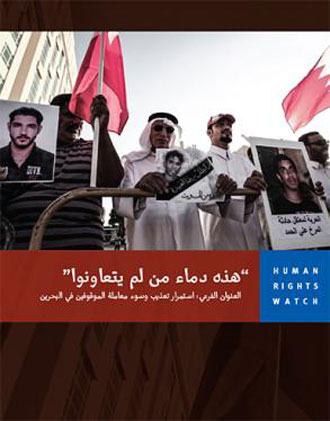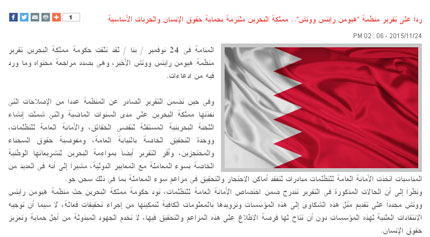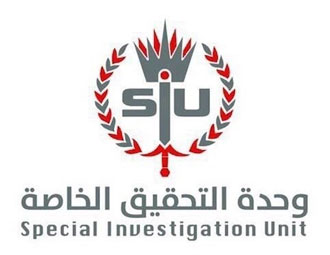
|
 |
 |
|
|
|
|
|
|
|
|
|
|
|
|
|
|
|
|
|
|
|
|
|
|
HRW: Torture of Detainees ContinuesOfficial Response: We Build on Human Rights SuccessesHuman Rights Watch’s (HRW) report on torture allegations in Bahrain has been based on interviews, conducted by telephone and Skype with 14 individuals, who had been in police detention or in prison, and with several Bahraini defence lawyers. According to HRW, the interviews were conducted in this manner because Bahraini authorities refused to grant visas to HRW team. The report reviewed the outcome of the activity of the Office of the Ombudsman and the Special Investigations Unit (SIU) concluding that they have both failed to provide proof of their effectiveness, a fact already illustrated when the SIU was sharply criticized in the 2013 annual report of the National Institute for Human Rights (NIHR), which described it as lacking “ the aspired independence and impartiality”. The appendices of the report included answers and responses from the ombudsman and the Ministry of Interior, most recently in November 2015, to HRW’s questions and inquiries. Apparently, HRW has deemed such responses inadequate due to their failure, in its opinion, to include sufficient data to refute HRW’s allegations on the lack of independence of those institutions.
The main focus of HRW report, issued in November 2015, is what it describes as Bahrain’s failure in the commitment to implement the recommendations of the Bahrain Independent Commission of Inquiry (BICI) regarding combating torture, despite the establishment of three bodies for this purpose, namely: the Office of the Ombudsman, the Special Investigations Unit (SIU) and the Prisoners and Detainees Rights Commission (PDRC). The report cites the lack of available information on investigations and prosecutions, and the fact that there have been no prosecutions for torture, as an indicator supporting its view on the failure to tackle the “culture of impunity”. The bottom line, according to Human Rights Watch, is that Bahrain still experiences the continuation of both the practice of torture and the culture of impunity and non-accountability. On the other hand, the report relied on the testimony of ten detainees, who claimed exposure to coercive interrogation, and that of four former inmates of Jaw prison who also claimed to have endured torture. Here, the report reviews what it describes as manifestations of the failure of the government institutions, established in response to the recommendations of the Bassiouni Commission, regarding combating torture. These include: The Office of the Ombudsman:
Special Investigation Unit (SIU): The report says that SIU has so far failed to hold senior security officials accountable for abuses against detainees. Criticism against the Government and demands for practical steps: On the other hand, according to the report, the Bahraini government has not allowed impartial review of the performance of these institutions to ensure their effectiveness. The report notes that the Government has cancelled the scheduled country visit of the UN Special Rapporteur on Torture after postponing an earlier visit in 2013. It also added that the government has not ratified the Optional Protocol to the Convention against Torture (OPCAT), which stipulates the setting up of a transparent and fully independent inspectorate (National Preventive Mechanisms). Given their lack of independence, according to the report, the previously mentioned Bahraini institutions fall well short of the basic standards that OPCAT requires. Moreover, the Bahraini government, refused to allow HWR to visit Bahrain. Report recommendations
HRW report has specified practical steps to be undertaken by the Government of Bahrain and other agencies:
Government’s responseThe Bahraini government has acted correctly by issuing a preliminary response the following day, on November 24, 2015, following HRW’s torture report, indicating that it is in the process of “reviewing its content, including the allegations it contains”. The response issued by the Bahraini Foreign Ministry noted that the report acknowledges “many of the reforms Bahrain has implemented over the past few years. These include the setting up of the Bahrain Independent Commission of Inquiry (BICI) and the establishment of independent watchdogs, namely the independent police Ombudsman, a Special Investigations Unit (SIU) within the Public Prosecution, and a Prisoners and Detainees Rights Commission (PDRC). It also recognizes the alignment between Bahrain’s national legislation on mistreatment with international standards. On several occasions, the report mentions initiatives taken by the independent police Ombudsman to inspect places of detention and investigate allegations of misconduct, including Jaw prison.”
The official statement added that since the “Cases mentioned in the Human Rights Watch report fall within the mandate of the independent police Ombudsman, the Government of Bahrain again urges Human Rights Watch to lodge all complaints with these institutions and provide them with sufficient information to enable them to conduct effective investigations. Efforts to safeguard and bolster human rights are not served by criticizing these institutions publicly before they have had the opportunity to receive and investigate the allegations.” The statement pointed out that the anonymous allegations contained in the report are “based on a very limited number of interviews, including interviews with some activists with a political agenda”, stressing that the Kingdom of Bahrain “continues to bolster the capabilities of its national institutions to carry out their mandates effectively. The awarding of the European Union’s Chaillot Prize to the independent police Ombudsman and the NIHR in 2014, and the Ombudsman’s admission to the International Ombudsmen Institute as a full voting member, are testament to the success of these efforts. These national institutions continue to build on their successes and play a vital role in safeguarding human rights in Bahrain.” The official statement expressed the Government of Bahrain’s concern that “allegations of torture from specific individuals in the report have in many cases already been responded to on previous occasions. For instance, the Ministry of Interior has responded publicly to one case on two occasions when Amnesty International investigated his case. The allegations may have changed, but the government’s position does not; no mistreatment occurred during arrest or detention of the case highlighted in the report.” Finally, the statement noted that “It is also of concern that two of the recommendations made by Human Rights Watch call for the suspension of cooperation programmes from the United Kingdom and technical assistance from the United Nation’s Office of the High Commissioner of Human Rights (OHCHR). Human Rights Watch should applaud and support the cooperation and technical assistance of other entities that are assisting in Bahrain’s reform progress. HRW is invited to take a look at the report issued by the National Institution for Human Rights (NIHR), for a more holistic approach towards addressing human rights developments.” How to respond to the report?Since the Bahraini Government has promised a comprehensive response to HRW report, and an investigation into the allegations of torture, we propose the following:
■ Information Minister: HRW Report ‘ Misleading and Unbalanced’ |


